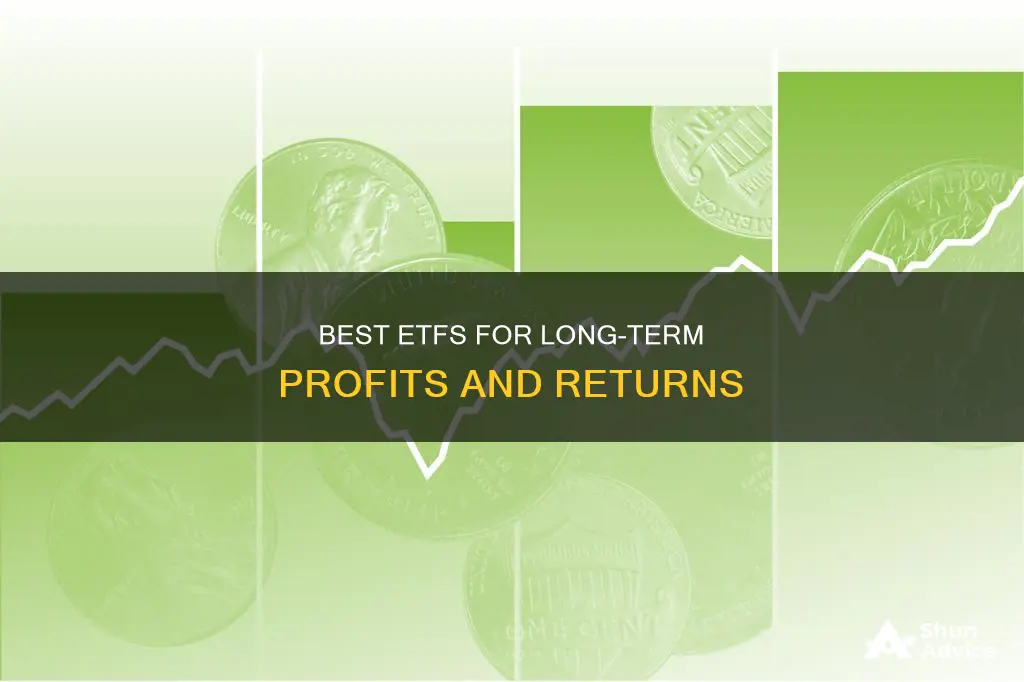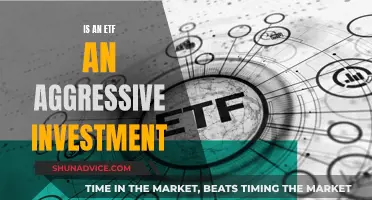
Exchange-traded funds (ETFs) are a good investment option for beginners and experienced investors alike. They are a collection of stocks or other assets in one fund with usually low expenses. ETFs are a good investment option because they offer benefits such as buying multiple assets in one fund, diversification, and generally low costs to manage the fund.
There are many types of ETFs, including:
- Top U.S. market-cap index ETFs
- Top international ETFs
- Sector ETFs
- Dividend ETFs
- Bond ETFs
- Balanced ETFs
- Commodity ETFs
- Currency ETFs
- Real estate ETFs (REIT ETFs)
- Volatility ETFs
- Leveraged ETFs
- Inverse ETFs
- Bitcoin ETFs
Some of the most profitable ETFs include:
- MicroSectors FANG+ Index 3X Leveraged ETN
- ProShares Ultra Semiconductors
- MicroSectors FANG+ Index 2X Leveraged ETNs
- Grayscale Ethereum Trust ETF
- Grayscale Bitcoin Trust ETF
- Direxion Daily Technology Bull 3X Shares
- ProShares UltraPro QQQ
- MicroSectors FANG+ ETN
- ProShares Ultra Technology
- VanEck Semiconductor ETF
- Global X MSCI Argentina ETF
- Global X Uranium ETF
- SPDR S&P Regional Bank ETF
- iShares Core S&P Small-Cap ETF
- iShares Core Dividend Growth ETF
- Vanguard S&P 500 ETF
- Invesco QQQ Trust
- Vanguard Growth ETF
What You'll Learn

Best ETFs for beginners
Exchange-traded funds (ETFs) are ideal for beginners due to their many benefits, such as low expense ratios, instant diversification, and a wide range of investment choices. ETFs are also a good choice for beginners because they don't require a lot of money to get started.
- Vanguard S&P 500 ETF (VOO): This ETF offers low fees, significant size, and diversified exposure for long-term investment. It has a very low expense ratio of 0.03%, which means investors will pay only $3 in annual fees for every $10,000 invested.
- Invesco QQQ Trust: This ETF provides access to top tech stocks and has outperformed the S&P 500 with its returns. It has an affordable expense ratio of 0.2%.
- Vanguard Growth ETF: This ETF simplifies investing in large-cap growth stocks via a low-expense, broad-index approach. It has a rock-bottom expense ratio of just 0.04%.
- IShares Core S&P Small-Cap ETF: This ETF provides broad exposure to small-cap stocks, which tend to be more volatile than the broader market. It has a large basket of small-cap stocks, reducing the risk. It also has a very low expense ratio of 0.06%.
- IShares Core Dividend Growth ETF: This ETF focuses on U.S. stocks with a history of growing their dividends per share. It has a trailing 12-month yield of 2.2%, which is higher than the dividend yield of an S&P 500 index fund. It also has a low expense ratio of 0.08%.
- Vanguard Total Stock Market ETF: This ETF provides exposure to all the stocks in the U.S. market, including large caps, mid caps, and small caps. It has a low expense ratio of 0.03%.
When choosing an ETF, beginners should consider their financial goals, risk tolerance, and how much they can afford to invest each month. It is also important to note that not all ETFs are diversified, so it is essential to understand the underlying holdings and investment objectives of an ETF before investing.
QQQ ETF: A Smart Investment Strategy for Beginners
You may want to see also

Best ETFs for long-term investment
When it comes to profitable investing, nothing quite matches a long-term approach. With that in mind, here are some of the best ETFs for long-term investment:
Vanguard S&P 500 ETF (VOO)
With assets of $528 billion and an expense ratio of 0.03% (or $3 annually per $10,000 invested), VOO is one of the largest funds by assets among any fund on the market. It's linked to the S&P 500 index of the largest US companies, which is the world's most closely followed benchmark of stocks. Top holdings include trillion-dollar tech stocks such as Apple, Microsoft, and leading healthcare stocks like Eli Lilly & Co. This leading Vanguard fund offers great liquidity and a rock-bottom expense ratio, making it a logical choice for investors interested in focusing on top US stocks.
Schwab U.S. Small-Cap ETF (SCHA)
This ETF is focused on small-cap stocks, with an average market capitalization of about $3.7 billion across roughly 1,750 total holdings. The larger number of total holdings in this ETF makes for an incredibly diversified lineup, which is an important feature for long-term investing to smooth out volatility. Top companies in this ETF include translation software specialist Duolingo, asset manager Stifel Financial Corp, and nuclear energy specialist BWX Technologies. It has assets of $18 billion and an expense ratio of 0.04%.
IShares Core S&P Mid-Cap ETF (IJH)
IJH focuses on stocks in the middle ground between mega-cap leaders and smaller upstarts, allowing investors to benefit from the potential upside of emerging companies while reducing the risk of investing in smaller companies. Top holdings include healthcare diagnostics firm Illumina and engineering specialist EMCOR Group. The average size of stocks is about $9 billion, and top sectors by weight include industrials (21%), financial services (16%), and consumer discretionary stocks (14%). It has assets of $91 billion and an expense ratio of 0.05%.
Vanguard Information Technology ETF (VGT)
As the largest technology-specific ETF on Wall Street, this Vanguard index fund is a simple way to invest in the most growth-oriented industry. There's a good mix of companies in its portfolio of more than 300 different tech stocks, but it's not diversified beyond this sector, making it much more exposed to trends unique to technology firms. Investors can get exposure to top Silicon Valley leaders like Apple, as well as smaller software, AI, and cloud computing companies. It has assets of $77 billion and an expense ratio of 0.10%.
Vanguard High Dividend Yield ETF (VYM)
This Vanguard fund prioritizes stable blue-chip stocks with reliable revenue and profits, which in turn fuels reliable dividends. While these stocks don't have the growth potential of tech startups, VYM makes up for it with an attractive 2.8% dividend yield – double the average yield of the typical S&P 500 stock. Top holdings include chipmaker Broadcom, financial giant JPMorgan, and Big Oil icon Exxon Mobil. It has assets of $59 billion and an expense ratio of 0.06%.
Vanguard Total International Stock ETF (VXUS)
For long-term investing, it's worth looking beyond domestic stocks to enjoy the growth potential of foreign markets and the diversification these regions can provide. The Vanguard Total International Stock ETF provides simple and cost-effective international exposure, with more than 8,600 stocks in its portfolio. This provides a mix of familiar and established companies such as Taiwan Semiconductor Manufacturing and European healthcare firm Novo Nordisk, along with smaller emerging market plays. The portfolio's focus is spread widely across the globe, with Japan, the UK, and China as the top regions. It has assets of $78 billion and an expense ratio of 0.08%.
IShares Core U.S. Aggregate Bond ETF (AGG)
This ETF provides diversification across asset classes, with a mammoth portfolio of more than 12,000 "investment-grade" bonds. That includes US Treasurys, loans to leading blue-chip stocks, and securitized mortgage debt backed by the federal government. You'll find just about any kind of bond except for risky "junk" bonds. This low-risk approach may not provide high growth potential, but it provides unmatched stability in the long term, along with a generous yield of 3.4% over the last 12 months. It has assets of $120 billion and an expense ratio of 0.03%.
Hedged vs Unhedged ETFs: Which Investment Option is Better?
You may want to see also

Best ETFs for short-term investment
When considering the most profitable ETFs to invest in, it's important to remember that not all ETFs are the same, and their performance depends on the stocks, bonds, and other assets they hold. Here are some of the best ETFs for short-term investment:
Vanguard S&P 500 ETF
The Vanguard S&P 500 ETF is a good choice for those seeking a low-cost, diversified investment in the broader market. With an expense ratio of just 0.03%, it's one of the largest and most popular ETFs. Its combination of low cost and large size makes it attractive for investors looking to capture the market's returns.
Invesco QQQ Trust
The Invesco QQQ Trust provides exposure to top tech stocks and has outperformed the S&P 500 with its returns. It tracks the Nasdaq-100 index, which includes 100 of the largest non-financial companies on the Nasdaq. With an affordable expense ratio of 0.2%, it's one of the best-performing ETFs, making it a good option for short-term tech-focused investments.
IShares Core Dividend Growth ETF
The iShares Core Dividend Growth ETF provides exposure to U.S. stocks with a history of growing their dividends per share. It has a low expense ratio of 0.08%, and as of late 2024, it offered a trailing 12-month yield of 2.2%, higher than the S&P 500 index fund. This ETF is suitable for those seeking income and steady returns in the short term.
SPDR Bloomberg 1-3 Month T-Bill ETF
This ETF is ideal for those seeking the security of U.S. Treasury bills without the hassle of managing individual issues. With an average effective duration of just 0.07 years, it provides stability in the face of interest rate changes. Its reasonable expense ratio of 0.135% makes it a cost-effective option for short-term investments.
IShares Short-Term National Muni Bond ETF
The iShares Short-Term National Muni Bond ETF is suitable for investors in higher tax brackets as it provides income exempt from federal taxes, and potentially state and local taxes as well. With an average effective duration of less than two years, it offers relative price stability. Its SEC yield is more than double its dividend yield, indicating a positive upward trend.
Vanguard Ultra-Short Bond ETF
The actively managed Vanguard Ultra-Short Bond ETF benefits from Vanguard's low-fee structure. With an average effective duration of 0.91, it offers stability in a rising interest rate environment. The fund's holdings include highly-rated corporate bonds, with approximately 40% of its rated securities considered investment-grade.
These ETFs offer a mix of broad market exposure, sector-specific investments, and fixed-income options, providing a range of opportunities for short-term investors.
A Simple Guide to STI ETF Investment
You may want to see also

Best ETFs for high returns
Exchange-traded funds (ETFs) are a great investment option for beginners and experts alike. They're relatively inexpensive, widely available, and tend to be less risky than investing in individual stocks. Here are some of the best ETFs to consider for high returns:
Vanguard S&P 500 ETF (VOO)
This ETF is a clear leader when it comes to long-term performance, with assets under management of $528 billion and an expense ratio of just 0.03%. It tracks the S&P 500 index, giving investors exposure to the largest U.S. companies, including tech giants like Apple and Microsoft. With a rock-bottom expense ratio and great liquidity, it's a logical choice for those interested in investing in top U.S. stocks.
Invesco QQQ Trust (QQQ)
The Invesco QQQ Trust provides access to top tech stocks and has outperformed the S&P 500 with its returns. It tracks the Nasdaq-100 index, which includes 100 of the largest non-financial companies on the Nasdaq. With an affordable expense ratio of 0.2%, it's one of the best-performing ETFs, generating a total return of around 420% over the last decade.
IShares Core S&P Mid-Cap ETF (IJH)
This ETF offers a good balance between mega-cap leaders and smaller upstarts, focusing on stocks in the middle ground with an average market capitalization of about $9 billion. It provides a mix of established companies and emerging players, with top holdings including health care diagnostics firm Illumina Inc. and engineering specialist EMCOR Group Inc. The expense ratio is 0.05%, making it a cost-effective option.
Vanguard Information Technology ETF (VGT)
As the largest technology-specific ETF on Wall Street, this Vanguard index fund offers exposure to the most growth-oriented industry. It provides a mix of well-known Silicon Valley leaders like Apple and smaller startups. While it's not diversified beyond the tech sector, it provides broad exposure to the long-term growth of the technology industry. The expense ratio is 0.10%.
Vanguard High Dividend Yield ETF (VYM)
This ETF from Vanguard prioritizes stable, blue-chip stocks with reliable revenue and profits, resulting in reliable dividends. While these stocks may not have the growth potential of tech startups, they make up for it with an attractive dividend yield of 2.8%. Top holdings include chipmaker Broadcom, financial giant JPMorgan, and energy icon Exxon Mobil. The expense ratio is 0.06%.
Vanguard Total International Stock ETF (VXUS)
For long-term investing, it's worth considering international exposure to enjoy the growth potential of foreign markets and the diversification they offer. This Vanguard ETF provides simple and cost-effective international exposure, with more than 8,600 stocks in its portfolio, including familiar companies like Taiwan Semiconductor Manufacturing and European healthcare firm Novo Nordisk, along with smaller emerging market plays. The expense ratio is 0.08%.
IShares Core U.S. Aggregate Bond ETF (AGG)
This ETF provides diversification across asset classes, with a portfolio of more than 12,000 "investment-grade" bonds, including U.S. Treasurys and loans to leading blue-chip stocks. It offers unmatched stability and a generous yield of 3.4% over the last 12 months, making it a good option for those seeking income without taking on high risk. The expense ratio is a low 0.03%.
Schwab U.S. Large-Cap Growth ETF (SCHG)
This ETF delivers impressive returns, aiming to match the large-capitalization growth index. It has an extremely low expense ratio of 0.04% and is passively managed, presenting tax-efficient performance from the largest and fastest-growing companies. While the holdings are not cheap, the ETF has outperformed both the category and index returns over the past decade.
SPDR S&P 500 ESG ETF (EFIV)
This ESG fund, launched in 2020, selects from the top 500 companies in the U.S. that meet sustainability criteria related to environmental, social, and governance metrics. It includes tech giants like Apple, Microsoft, and Amazon, and has outperformed the index and its Large Cap Blend category peers. The expense ratio is not readily available, but it's an attractive option for those interested in ESG investing.
IShares ESG Advanced MSCI EAFE ETF (DMXF)
Launched in 2020, this ETF delivers faster growth and higher quality than its foreign large-cap blend peers. It includes large and mid-cap firms from Europe, Australia, and Asia with positive ESG ratings, screening out companies involved in activities like weaponry, fossil fuels, and tobacco. In its short tenure, it has outperformed the index and its peers. The expense ratio is 0.09%.
Direxion NASDAQ-100 Equal Wtd ETF (QQQE)
This ETF provides exposure to the Nasdaq-100 index but with a twist. Instead of market capitalization weighting, it allocates the top 100 Nasdaq stocks equally, resulting in less exposure to the biggest names and more weight on smaller ones. This equal-weight strategy aims to deliver growth with slightly less volatility. The 10-year performance is better than the large-cap growth category average. The expense ratio is 0.35%.
Schwab ETF Investing: A Beginner's Guide
You may want to see also

Best ETFs for low fees
When it comes to investing in ETFs, fees are an important consideration. Here are some of the best ETFs for low fees:
Vanguard S&P 500 ETF
The Vanguard S&P 500 ETF is a popular choice for investors seeking a low-fee option. With an expense ratio of just 0.03%, it is significantly lower than the average for similar funds, which is typically around 0.78%. This means that investors will only pay $3 in annual fees for every $10,000 invested, compared to $78 for a typical competing fund. The ETF also offers diversified exposure and is one of the largest and most popular options in the market.
Invesco QQQ Trust
The Invesco QQQ Trust provides access to top tech stocks and has outperformed the S&P 500 with its returns. It has an affordable expense ratio of 0.2%, making it a cost-effective option for investors looking for exposure to the tech sector.
Vanguard Growth ETF
The Vanguard Growth ETF is another low-fee option, with an expense ratio of just 0.04%. This ETF provides access to large-cap growth stocks and is a good choice for investors who want to invest in growth stocks without actively picking individual stocks.
IShares Core S&P Small-Cap ETF
The iShares Core S&P Small-Cap ETF offers broad exposure to small-cap stocks, and its low expense ratio of 0.06% makes it a cost-effective way to add small-cap exposure to your portfolio. The ETF holds more than 635 stocks and has a diversified portfolio, reducing the risk associated with investing in individual small-cap stocks.
IShares Core Dividend Growth ETF
The iShares Core Dividend Growth ETF provides exposure to U.S. stocks with a history of dividend growth. With an expense ratio of 0.08%, investors can keep more of the dividend income produced by the ETF. This ETF is a good choice for those seeking dividend income and long-term price appreciation.
Vanguard Total Stock Market ETF
The Vanguard Total Stock Market ETF provides exposure to the entire U.S. stock market, including large-cap, mid-cap, and small-cap stocks. With a low expense ratio of 0.03%, it is an affordable way to invest in a diverse range of U.S. stocks.
These ETFs offer a combination of low fees and diverse investment options, making them attractive choices for investors seeking to minimize costs while accessing a broad range of investment opportunities.
A Beginner's Guide to S&P 500 ETF Investing
You may want to see also
Frequently asked questions
As of December 2024, the iShares Core Dividend Growth ETF looked attractive relative to other top ETFs. Its price had underperformed the market, but with rates expected to continue falling in 2025, dividend stocks could outperform.
The VanEck Semiconductor ETF. This fund focuses on semiconductor stocks and has delivered a 28.2% average annualised total return over the past 10 years.
ETFs are great for beginners, and the best option for those new to investing is one focused on the broader market. The Vanguard S&P 500 ETF and the Vanguard Total Stock Market ETF are top options, owning hundreds of stocks and with low expense ratios.







